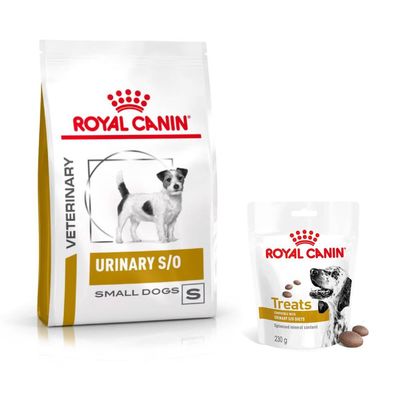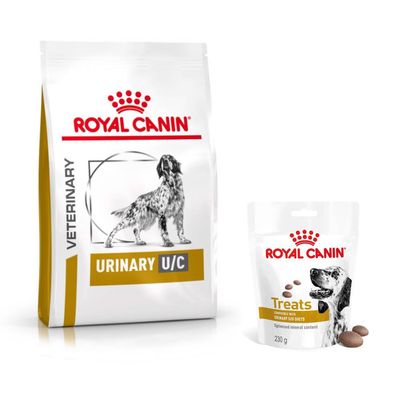Urinary Dog Food
Bladder, urinary and struvite stones - Veterinarian Dr. Franziska G. explains:

"Bladder stones in dogs such as struvite stones are caused by mineral deposits that combine in the bladder to form crystals and then larger stones. If bladder stones obstruct the flow of urine, this can lead to serious health problems. In addition to urinary retention and kidney damage, there is also a risk of poisoning, as the body can no longer excrete the toxins in the urine.
To avoid such complications, early and correct treatment is crucial. In addition to drug treatment, it is possible to treat bladder stones with special dog food. Special dog food for bladder stones targets the urinary environment and can therefore combat and prevent urinary stones."
This content is a translation of the original text published on zooplus.de, created by Veterinarian Dr.med.vet. Franziska G., in collaboration with our editorial team. The information provided is for general guidance only and is not a substitute for professional veterinary advice, diagnosis or treatment. Always consult your vet if you have any concerns about your pet’s health or wellbeing.
Bladder, urinary and struvite stones - Veterinarian Dr. Franziska G. explains:

"Bladder stones in dogs such as struvite stones are caused by mineral deposits that combine in the bladder to form crystals and then larger stones. If bladder stones obstruct the flow of urine, this can lead to serious health problems. In addition to urinary retention and kidney damage, there is also a risk of poisoning, as the body can no longer excrete the toxins in the urine.
To avoid such complications, early and correct treatment is crucial. In addition to drug treatment, it is possible to treat bladder stones with special dog food. Special dog food for bladder stones targets the urinary environment and can therefore combat and prevent urinary stones."
This content is a translation of the original text published on zooplus.de, created by Veterinarian Dr.med.vet. Franziska G., in collaboration with our editorial team. The information provided is for general guidance only and is not a substitute for professional veterinary advice, diagnosis or treatment. Always consult your vet if you have any concerns about your pet’s health or wellbeing.
What is dog food for bladder stones?
Dog food for bladder stones has been developed to prevent the formation of new bladder stones and to break down existing ones. This occurs through a change in the urinary environment. This mainly concerns the pH value (measure of the amount of acids and bases) and the concentration of minerals in the urine. Dog food for bladder stones is particularly low in calcium, magnesium and phosphorus and will promote either acidic or alkaline urine, depending on the type of stone. The key characteristic of dog food for struvite stones is that it acidifies the urine.
What is dog food for bladder stones?
Dog food for bladder stones has been developed to prevent the formation of new bladder stones and to break down existing ones. This occurs through a change in the urinary environment. This mainly concerns the pH value (measure of the amount of acids and bases) and the concentration of minerals in the urine. Dog food for bladder stones is particularly low in calcium, magnesium and phosphorus and will promote either acidic or alkaline urine, depending on the type of stone. The key characteristic of dog food for struvite stones is that it acidifies the urine.
What does dog food do for bladder stones?
The following properties allow this kind of dog food to break down existing urinary stones and help ensure that no new stones form:
- Low mineral content: Dog food for urinary stones is low in minerals (e.g. calcium, phosphorus) so that fewer urinary crystals form.
- Regulation of pH value: Depending on the type of stones, the dog food will alter the pH value of the urine. It will either become more acidic (e.g. dog food for struvite stones) or more alkaline (e.g. dog food for calcium oxalate stones).
- Usually wet food: Dog food for bladder stones often comes as wet food, as it dilutes the urine and reduces the risk of new crystals forming.
- Protection against urinary tract infections: The special ingredients in some types of food can prevent urinary tract infections, which increase the risk of bladder stones.
What does dog food do for bladder stones?
The following properties allow this kind of dog food to break down existing urinary stones and help ensure that no new stones form:
- Low mineral content: Dog food for urinary stones is low in minerals (e.g. calcium, phosphorus) so that fewer urinary crystals form.
- Regulation of pH value: Depending on the type of stones, the dog food will alter the pH value of the urine. It will either become more acidic (e.g. dog food for struvite stones) or more alkaline (e.g. dog food for calcium oxalate stones).
- Usually wet food: Dog food for bladder stones often comes as wet food, as it dilutes the urine and reduces the risk of new crystals forming.
- Protection against urinary tract infections: The special ingredients in some types of food can prevent urinary tract infections, which increase the risk of bladder stones.
What are signs of bladder stones in dogs?
If you notice the following symptoms in your dog, you should take them to your vet to rule out urinary stones, such as struvite stones:
- Urinating more frequently (polyuria)
- Pain when urinating and frequent low amounts of urination (stranguria)
- Blood in urine (haematuria)
- Your dog seems listless and eats less
If your dog can no longer urinate at all, this is indicative of urinary retention. This is an urgent emergency that requires immediate veterinary attention.
What are signs of bladder stones in dogs?
If you notice the following symptoms in your dog, you should take them to your vet to rule out urinary stones, such as struvite stones:
- Urinating more frequently (polyuria)
- Pain when urinating and frequent low amounts of urination (stranguria)
- Blood in urine (haematuria)
- Your dog seems listless and eats less
If your dog can no longer urinate at all, this is indicative of urinary retention. This is an urgent emergency that requires immediate veterinary attention.
What causes struvite stones and other bladder stones in dogs?
The development of urinary stones and therefore also bladder stones is caused by various factors and can be exacerbated by certain risk factors:
| Feature- | High mineral intake |
|---|---|
| Description- | f your dog consumes too many minerals such as magnesium, calcium or phosphorus in its diet, the risk of urinary crystals forming increases. |
| Feature- | Urinary tract infections |
| Description- | Bacteria can make urine more alkaline, which promotes the formation of some urinary stones (e.g. struvite stones). |
| Feature- | Age |
| Description- | Older dogs are more prone to developing bladder stones. |
| Feature- | Genetic predisposition |
| Description- | Some dog breeds are more susceptible to the formation of urinary stones. These include, for example, Dalmatians and English Bulldogs. Males also appear to have a higher risk of the disease. |
| Feature- | Insufficient hydration |
| Description- | If your dog drinks too little, their urine becomes concentrated, and the risk of mineral deposits increases. |
| Feature- | Underlying diseases |
| Description- | Some diseases (e.g. kidney disease in dogs) can promote the formation of certain bladder stones. |
Feature- | Description- |
|---|---|
High mineral intake | f your dog consumes too many minerals such as magnesium, calcium or phosphorus in its diet, the risk of urinary crystals forming increases. |
Urinary tract infections | Bacteria can make urine more alkaline, which promotes the formation of some urinary stones (e.g. struvite stones). |
Age | Older dogs are more prone to developing bladder stones. |
Genetic predisposition | Some dog breeds are more susceptible to the formation of urinary stones. These include, for example, Dalmatians and English Bulldogs. Males also appear to have a higher risk of the disease. |
Insufficient hydration | If your dog drinks too little, their urine becomes concentrated, and the risk of mineral deposits increases. |
Underlying diseases | Some diseases (e.g. kidney disease in dogs) can promote the formation of certain bladder stones. |
What causes struvite stones and other bladder stones in dogs?
The development of urinary stones and therefore also bladder stones is caused by various factors and can be exacerbated by certain risk factors:
| Feature- | High mineral intake |
|---|---|
| Description- | f your dog consumes too many minerals such as magnesium, calcium or phosphorus in its diet, the risk of urinary crystals forming increases. |
| Feature- | Urinary tract infections |
| Description- | Bacteria can make urine more alkaline, which promotes the formation of some urinary stones (e.g. struvite stones). |
| Feature- | Age |
| Description- | Older dogs are more prone to developing bladder stones. |
| Feature- | Genetic predisposition |
| Description- | Some dog breeds are more susceptible to the formation of urinary stones. These include, for example, Dalmatians and English Bulldogs. Males also appear to have a higher risk of the disease. |
| Feature- | Insufficient hydration |
| Description- | If your dog drinks too little, their urine becomes concentrated, and the risk of mineral deposits increases. |
| Feature- | Underlying diseases |
| Description- | Some diseases (e.g. kidney disease in dogs) can promote the formation of certain bladder stones. |
Feature- | Description- |
|---|---|
High mineral intake | f your dog consumes too many minerals such as magnesium, calcium or phosphorus in its diet, the risk of urinary crystals forming increases. |
Urinary tract infections | Bacteria can make urine more alkaline, which promotes the formation of some urinary stones (e.g. struvite stones). |
Age | Older dogs are more prone to developing bladder stones. |
Genetic predisposition | Some dog breeds are more susceptible to the formation of urinary stones. These include, for example, Dalmatians and English Bulldogs. Males also appear to have a higher risk of the disease. |
Insufficient hydration | If your dog drinks too little, their urine becomes concentrated, and the risk of mineral deposits increases. |
Underlying diseases | Some diseases (e.g. kidney disease in dogs) can promote the formation of certain bladder stones. |
What can dogs with bladder stones eat?
If your dog has bladder stones, you should, in consultation with your vet, feed them dog food that acidifies the urine and is low in minerals like magnesium. The food should also help increase your dog's water intake.
What can dogs with bladder stones eat?
If your dog has bladder stones, you should, in consultation with your vet, feed them dog food that acidifies the urine and is low in minerals like magnesium. The food should also help increase your dog's water intake.
Which foods should dogs with struvite crystals avoid?
Dogs with struvite crystals should avoid foods high in minerals and protein, as these can favour the formation of struvite stones. A high proportion of plant-based ingredients should also be avoided, as they can increase the pH value of the urine and thus promote the formation of struvite crystals.
Which foods should dogs with struvite crystals avoid?
Dogs with struvite crystals should avoid foods high in minerals and protein, as these can favour the formation of struvite stones. A high proportion of plant-based ingredients should also be avoided, as they can increase the pH value of the urine and thus promote the formation of struvite crystals.
Which treats are suitable for bladder stones?
Special treats that are low in minerals and protein and high in fluids are best for bladder stones.
Which treats are suitable for bladder stones?
Special treats that are low in minerals and protein and high in fluids are best for bladder stones.























